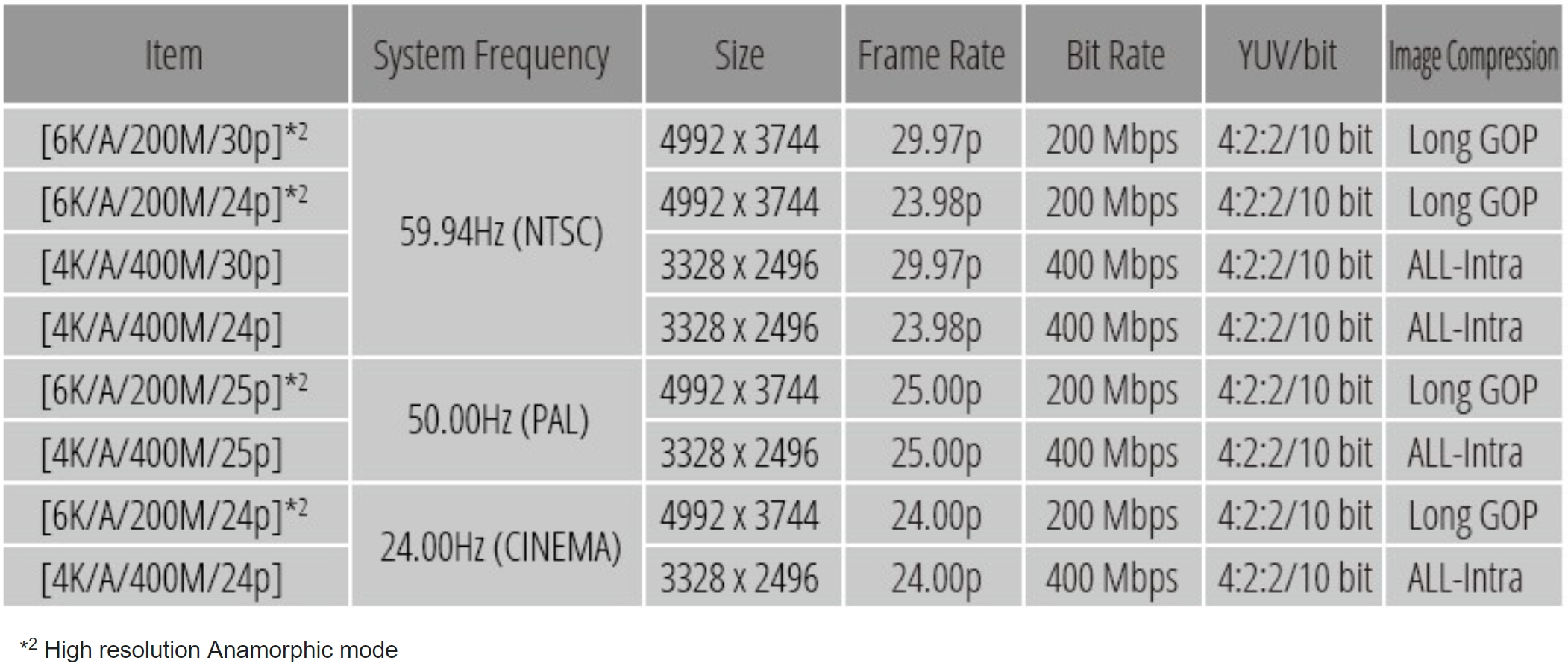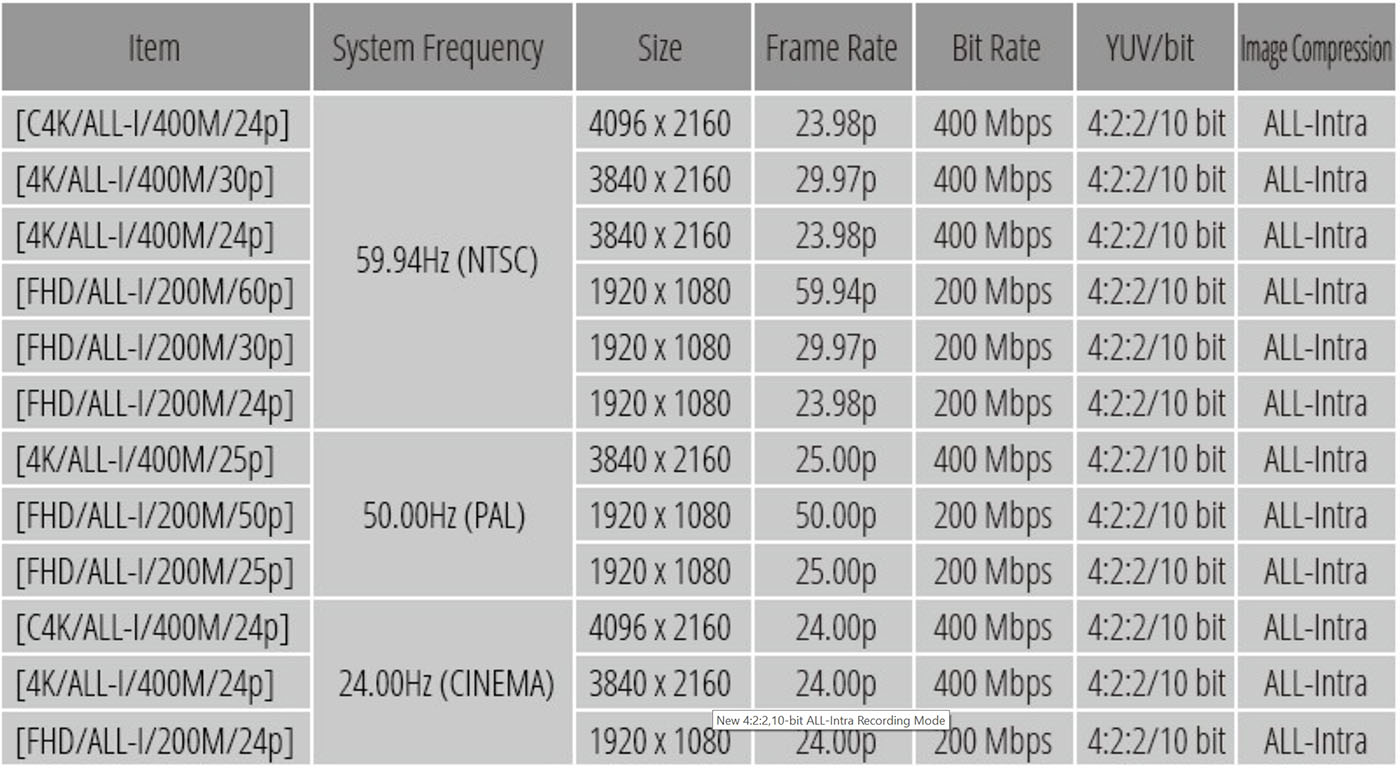
When Panasonic first unveiled its 4K powerhouse GH5 camera, it seemed to promise 6K, 30fps video. That only turned out to be a burst mode for stills, but now, Panasonic has actually made good by unveiling
a 6K anamorphic, 4,992 x 3,744, 10-bit resolution video mode. On top of
that, it made 4K more useful by unveiling an "intra-frame," full 4K,
10-bit option that compresses each frame individually at a robust 400
Mbps data rate.
What Panasonic calls 6K (4,992 x 3,774 pixels) might seem like 5K,
but that's not quite how it works. For 6K anamorphic, the GH5 actually
reads out nearly its entire 20.3-megapixel sensor. The resulting 3:2,
18.9-megapixel images have the same number of pixels as 2:1 6K
anamorphic (6,144 x 2,072). To shoot that way, you need an anamorphic
lens, which squishes
the widescreen image to 2:1, and during post-production, it's stretched
back to the correct ratio. (Those lenses produce a unique look, most
notoriously the "JJ Abrams lens flares.")
 With
the release of this option, the GH5 becomes one of the
highest-resolution 6K anamorphic cameras, despite costing tens of
thousands less than models from RED and Alexa, EOS HD
points out. While the images are 10-bit, the data rate is low for this
mode (200 Mbps) compared to rival cameras, however. If you want more
data, you can shoot 4K anamorphic (3,328 x 2,496 resolution) at 400
Mbps. Hopefully, Panasonic will bump the 6K anamorphic data rate at some
point.
With
the release of this option, the GH5 becomes one of the
highest-resolution 6K anamorphic cameras, despite costing tens of
thousands less than models from RED and Alexa, EOS HD
points out. While the images are 10-bit, the data rate is low for this
mode (200 Mbps) compared to rival cameras, however. If you want more
data, you can shoot 4K anamorphic (3,328 x 2,496 resolution) at 400
Mbps. Hopefully, Panasonic will bump the 6K anamorphic data rate at some
point.
The other new feature, 4K intra-frame capture, may be more
valuable, even though it sounds less interesting than "6K." Most
consumer cameras capture video in a so-called "inter-frame" format, like
H.264, MPEG-4 or Sony's XAVC, saving data by recording how one image
differs from the next. Intra-frame compresses each file individually,
without regard to others, much like how JPEG files work.
 The
resulting images are easier to edit and work better for action
sequences, but they tend to be much larger than inter-frame files. So,
Panasonic introduced a 400Mbps "All-I," 10bit 4:2:2 codec, doubling the
previous data rate. That's a higher throughput than many pro cameras,
including Sony's $7,500 4K FS7 XDCAM, even though the GH5 costs less
than a quarter the price ($1,700). As mentioned, the new data rate
doesn't work yet for 6K anamorphic, and you'll probably need a
high-speed UHS-II class SD card.
The
resulting images are easier to edit and work better for action
sequences, but they tend to be much larger than inter-frame files. So,
Panasonic introduced a 400Mbps "All-I," 10bit 4:2:2 codec, doubling the
previous data rate. That's a higher throughput than many pro cameras,
including Sony's $7,500 4K FS7 XDCAM, even though the GH5 costs less
than a quarter the price ($1,700). As mentioned, the new data rate
doesn't work yet for 6K anamorphic, and you'll probably need a
high-speed UHS-II class SD card.
If those major new feature
additions aren't enough, Panasonic also improved autofocus for both
stills and video, and added a new "hybrid log gamma" shooting mode that
can be read by certain types of HDR 4K TVs. The new firmware will be
available at Panasonic's website at the end of September
When Panasonic first unveiled its 4K powerhouse GH5 camera, it seemed to promise 6K, 30fps video. That only turned out to be a burst mode for stills, but now, Panasonic has actually made good by unveiling
a 6K anamorphic, 4,992 x 3,744, 10-bit resolution video mode. On top of
that, it made 4K more useful by unveiling an "intra-frame," full 4K,
10-bit option that compresses each frame individually at a robust 400
Mbps data rate.
What Panasonic calls 6K (4,992 x 3,774 pixels) might seem like 5K,
but that's not quite how it works. For 6K anamorphic, the GH5 actually
reads out nearly its entire 20.3-megapixel sensor. The resulting 3:2,
18.9-megapixel images have the same number of pixels as 2:1 6K
anamorphic (6,144 x 2,072). To shoot that way, you need an anamorphic
lens, which squishes
the widescreen image to 2:1, and during post-production, it's stretched
back to the correct ratio. (Those lenses produce a unique look, most
notoriously the "JJ Abrams lens flares.")
 With
the release of this option, the GH5 becomes one of the
highest-resolution 6K anamorphic cameras, despite costing tens of
thousands less than models from RED and Alexa, EOS HD
points out. While the images are 10-bit, the data rate is low for this
mode (200 Mbps) compared to rival cameras, however. If you want more
data, you can shoot 4K anamorphic (3,328 x 2,496 resolution) at 400
Mbps. Hopefully, Panasonic will bump the 6K anamorphic data rate at some
point.
With
the release of this option, the GH5 becomes one of the
highest-resolution 6K anamorphic cameras, despite costing tens of
thousands less than models from RED and Alexa, EOS HD
points out. While the images are 10-bit, the data rate is low for this
mode (200 Mbps) compared to rival cameras, however. If you want more
data, you can shoot 4K anamorphic (3,328 x 2,496 resolution) at 400
Mbps. Hopefully, Panasonic will bump the 6K anamorphic data rate at some
point.
The other new feature, 4K intra-frame capture, may be more valuable, even though it sounds less interesting than "6K." Most consumer cameras capture video in a so-called "inter-frame" format, like H.264, MPEG-4 or Sony's XAVC, saving data by recording how one image differs from the next. Intra-frame compresses each file individually, without regard to others, much like how JPEG files work.
 The
resulting images are easier to edit and work better for action
sequences, but they tend to be much larger than inter-frame files. So,
Panasonic introduced a 400Mbps "All-I," 10bit 4:2:2 codec, doubling the
previous data rate. That's a higher throughput than many pro cameras,
including Sony's $7,500 4K FS7 XDCAM, even though the GH5 costs less
than a quarter the price ($1,700). As mentioned, the new data rate
doesn't work yet for 6K anamorphic, and you'll probably need a
high-speed UHS-II class SD card.
The
resulting images are easier to edit and work better for action
sequences, but they tend to be much larger than inter-frame files. So,
Panasonic introduced a 400Mbps "All-I," 10bit 4:2:2 codec, doubling the
previous data rate. That's a higher throughput than many pro cameras,
including Sony's $7,500 4K FS7 XDCAM, even though the GH5 costs less
than a quarter the price ($1,700). As mentioned, the new data rate
doesn't work yet for 6K anamorphic, and you'll probably need a
high-speed UHS-II class SD card.
If those major new feature additions aren't enough, Panasonic also improved autofocus for both stills and video, and added a new "hybrid log gamma" shooting mode that can be read by certain types of HDR 4K TVs. The new firmware will be available at Panasonic's website at the end of September

The other new feature, 4K intra-frame capture, may be more valuable, even though it sounds less interesting than "6K." Most consumer cameras capture video in a so-called "inter-frame" format, like H.264, MPEG-4 or Sony's XAVC, saving data by recording how one image differs from the next. Intra-frame compresses each file individually, without regard to others, much like how JPEG files work.

If those major new feature additions aren't enough, Panasonic also improved autofocus for both stills and video, and added a new "hybrid log gamma" shooting mode that can be read by certain types of HDR 4K TVs. The new firmware will be available at Panasonic's website at the end of September

No comments:
Post a Comment